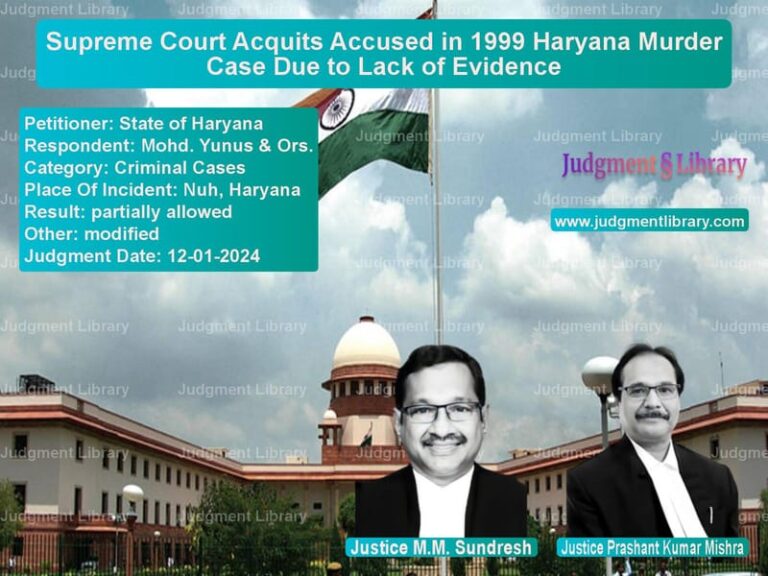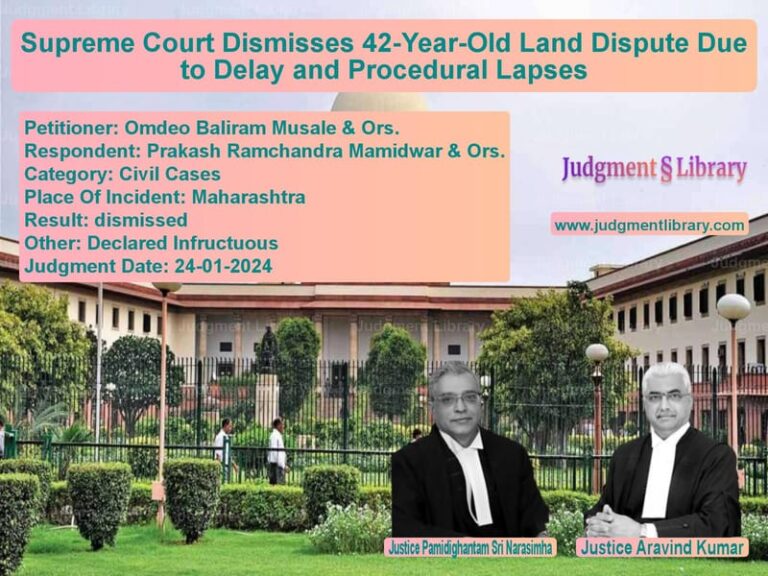Coal Washing Cost Dispute: Supreme Court Rules in Favor of Nabha Power Limited
The case of Nabha Power Limited vs. Punjab State Power Corporation Limited revolves around the recovery of deductions from monthly tariffs under the Electricity Act, 2003. The dispute originated when the appellant, Nabha Power Limited (NPL), sought the recovery of certain costs, specifically the washing cost of coal and the transportation of coal from the mine to the project site. The case traveled through multiple legal forums, including the Regulatory Commission, Appellate Tribunal, and ultimately, the Supreme Court of India, which delivered a final judgment on the matter.
Background of the Case
The core of the dispute lay in the determination of the appellant’s entitlement to specific costs related to the coal supplied for power generation. The appellant sought to recover the washing costs and transportation costs associated with coal, including road transportation for the period when it was deemed necessary. The parties were bound by a power purchase agreement (PPA), but disagreements arose over the implementation of the pricing of coal and the related costs.
The respondent, Punjab State Power Corporation Limited (PSPCL), contested these claims, leading to the matter being taken up for resolution under the Electricity Act, 2003. The earlier judgments, including one from the Regulatory Commission and Appellate Tribunal, did not provide the desired relief to Nabha Power Limited, prompting the case to be taken up with the Supreme Court.
Legal Issues Raised
The primary issue before the Court was whether Nabha Power Limited was entitled to recover the washing cost of coal and transportation expenses. Additionally, there was the question of whether the Gross Calorific Value (GCV) of coal should be taken at the project site or at the mine site.
The appellant, Nabha Power Limited, contended that the washing costs and transportation costs were integral to the process of delivering coal for power generation and should be reimbursed as per the terms of the PPA. The respondents, on the other hand, raised concerns over the calculation methods and the financial implications of these costs, arguing that they should not be held responsible for excessive payments.
Appellant’s Arguments
The appellant’s counsel presented the following arguments:
- Washing and Transportation Costs: The appellant argued that they were entitled to recover the washing cost of coal, as it was a necessary process to ensure the quality of coal for power generation. The transportation costs, including road transportation, were also deemed essential for the delivery of coal from the mine site to the project site.
- Gross Calorific Value (GCV): The appellant maintained that the GCV of the coal should be measured at the project site. This method, they argued, accurately reflected the quality of the coal as received and was in line with industry standards.
- Delayed Payments: Nabha Power Limited pointed out that despite multiple legal proceedings, the respondent had failed to make the payments due, which had caused further financial strain. The appellant sought relief, including interest on the delayed payments.
- Incorrect Calculation: The appellant also contested the respondent’s calculation methods, which they believed inflated the cost and caused unnecessary financial burden. They demanded a proper calculation of the washing and transportation costs, as per the established norms in the power sector.
Respondent’s Arguments
The respondents, Punjab State Power Corporation Limited, presented the following counterarguments:
- Excessive Costs: The respondent argued that the appellant’s claim for washing and transportation costs was unreasonable and should not be reimbursed. They contended that the cost of washing coal was not justified and that the process of transporting coal should have been accounted for within the existing tariff structure.
- Discrepancies in GCV Measurements: The respondents raised concerns over discrepancies in the GCV of coal and argued that the process used by the appellant for determining GCV at the project site could lead to inflated figures. They claimed that this mismatch caused larger financial commitments and should not be passed on to the respondents.
- Existing Financial Commitments: The respondent also highlighted the financial strain caused by the appellant’s claims, arguing that allowing the appellant to recover these costs would place an unreasonable burden on the state-owned utility, which would ultimately affect the consumers.
Supreme Court’s Judgment
The Supreme Court, after reviewing the arguments presented by both sides, made the following key observations:
- Washing Cost of Coal: The Court held that the appellant was entitled to the washing cost of coal. The washing process, as per the Court’s view, was an integral part of coal preparation for power generation, and thus the appellant had the right to recover these costs.
- Transportation Costs: Similarly, the transportation costs from the mine to the project site, including the cost of road transportation, were deemed necessary for the successful completion of the coal supply chain, and the appellant was entitled to recover these expenses.
- Gross Calorific Value (GCV): The Court also agreed with the appellant’s stance on GCV, ruling that the GCV of coal should be measured at the project site, as it more accurately reflected the quality of coal received at the power plant.
- Delayed Payments and Interest: In light of the lengthy legal proceedings and the non-payment of dues, the Court directed the respondent to remit the amount due to the appellant within three months. The Court also held that the overdue amount would accrue interest at the rate of 12% per annum, simple interest, from the due date.
- Fresh Disputes and Future Claims: The Court acknowledged that the issues raised by the respondent regarding discrepancies in GCV and coal washing were beyond the scope of the earlier judgment and represented new disputes. The Court ruled that such disputes could be raised separately before the relevant authorities, but they would not affect the current judgment or the amounts already determined for payment.
Legal Precedents Cited
The Court referred to several legal precedents related to the interpretation of contracts and the recovery of costs under power purchase agreements. The principles outlined in earlier cases such as Union of India v. Tarsem Singh and Union of India v. N Murugesan were applied to determine the legality of the appellant’s claims and the respondent’s obligations to honor the contract terms.
Conclusion
This judgment clarifies the issues surrounding the recovery of washing and transportation costs in the power sector, as well as the proper calculation of GCV for coal. The Court’s ruling underscores the importance of adhering to the terms of power purchase agreements and providing clarity on the recovery of such costs. It also sets a precedent for handling disputes related to coal pricing and tariff structures in the power generation sector.
Petitioner Name: Nabha Power Limited.Respondent Name: Punjab State Power Corporation Limited.Judgment By: Justice Sanjay Kishan Kaul, Justice Sudhanshu Dhulia, Justice Aravind Kumar.Place Of Incident: Punjab.Judgment Date: 09-10-2023.
Don’t miss out on the full details! Download the complete judgment in PDF format below and gain valuable insights instantly!
Download Judgment: nabha-power-limited-vs-punjab-state-power-c-supreme-court-of-india-judgment-dated-09-10-2023.pdf
Directly Download Judgment: Directly download this Judgment
See all petitions in Income Tax Disputes
See all petitions in Banking Regulations
See all petitions in Tax Refund Disputes
See all petitions in Judgment by Sanjay Kishan Kaul
See all petitions in Judgment by Sudhanshu Dhulia
See all petitions in Judgment by Aravind Kumar
See all petitions in allowed
See all petitions in supreme court of India judgments October 2023
See all petitions in 2023 judgments
See all posts in Taxation and Financial Cases Category
See all allowed petitions in Taxation and Financial Cases Category
See all Dismissed petitions in Taxation and Financial Cases Category
See all partially allowed petitions in Taxation and Financial Cases Category







